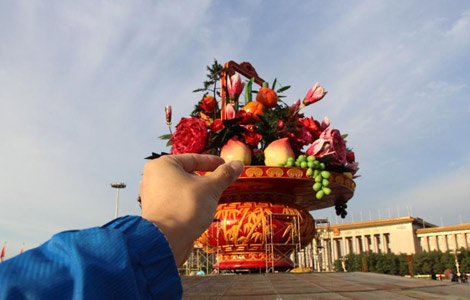Clean, green quality wines
Updated: 2013-09-25 15:32
By Zhang Zhao (China Daily)
|
|||||||||||
 |
|
About 500 academics, officials and specialists attended the event in Yinchuan, capital of the Ningxia Hui autonomous region. |
He added that dryer and colder conditions in Ningxia could be an advantage because it leads to less damage from pests.
Li said that the quality of wine does not just refer to the appearance, bouquet and taste of wine itself, but more to "the representation of a specific time and space".
He introduced the concept of "outer quality", including the environment of the vineyard and chateau, nearby scenery and the packaging.
The outer quality could embody the wine producer's understandings and feel of life, which is then delivered to the consumers, he said. "The wine industry is incomplete if there is only 'inner quality'."
"Combining the unique ecology, culture and tourism resources in Ningxia, we can develop world-class wine production that is unique," he said.
He called for an overall quality control system that "covers from land to table" and integrates agriculture, industry and service sectors for a sustainable development.
He also suggested that Ningxia adopt a "small chateau" model, because many small-scaled chateaus will lead to diverse styles of wine, and reduce risks.
Professor Qiu Wenping, director of the Center for Grapevine Biotechnology at Missouri State University, presented a paper on the threat of grape viruses. He said more than 60 types of viruses have been found in grapes, the largest number in all fruits.
"The viruses may not cause impact to grapes and wines in the short terms, but they severely influence the sweetness and acid level of grapes, damaging the quality of wine."
During his research in Ningxia over the past few years, he found viral diseases in all grape-growing bases, and in some, the infection rate was as high as 80 percent.
Qiu said the most important way to prevent the spread of viruses is to plant clean stocks.
He also suggested that local authorities must produce more virus-tested grape varieties, establish new vineyards with blocks in lands, found large-scale testing centers and develop registration, certification and inspection systems.
To that respect, he added that the Ningxia Forestry Institute had already established virus testing and virus-free plants cultivating systems, and has started quick and large-scale reproduction.
The conference was attended by about 500 gathered academics, officials and invited specialists, with other auxiliary activities such as visits to the Helan Mountain vineyards and various cellar tastings.
Related Stories
Top 9 most expensive wines in the world 2013-09-03 09:56
Go west, wine lovers, for China's best 2013-09-01 08:11
China makes 1st investment in South African wine industry 2013-08-28 10:46
China' first wine cellar opens in Changli county 2013-08-23 11:01
Wine is art that's easy to appreciate 2013-08-11 09:00
Today's Top News
208 killed as quake hits SW Pakistan
China to inaugurate Shanghai FTZ on Sept 29
China expects to complete space station by 2023
China's investment a 'job-saver' in Europe
UN General Assembly starts debate
China aims to attract more foreign students
Company head admits bribe charges
Trending news across China
Hot Topics
Lunar probe , China growth forecasts, Emission rules get tougher, China seen through 'colored lens', International board,
Editor's Picks

|

|

|

|

|

|





